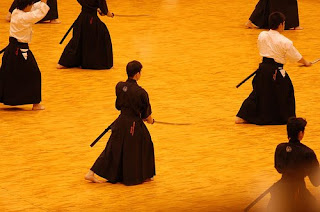 Recognising that it's not my job to run the world has been a vital part of my recovery. So much so that, despite studying within the Vajrayana tradition for a decade now, until recently I wouldn't even consider taking any kind of initiation, I was totally content with ngöndro practices.
Recognising that it's not my job to run the world has been a vital part of my recovery. So much so that, despite studying within the Vajrayana tradition for a decade now, until recently I wouldn't even consider taking any kind of initiation, I was totally content with ngöndro practices.So content that I didn't even go in for the so-called blessing initiations whereby - in Lama Thubten Zopa's words - "without a great initiation, you receive some blessing rather than the actual je-nang". Quite how the full je-nang and other aspects of initiation work is a complex question as Tibetan Lama's meet the West and broaden traditional practices of bestowing je-nang as blessings.
Just thinking about the complexities of initiation... or should I call it empowerment?... makes my brain hurt... not good for this addict who needs to "keep it simple". So... some of my avoidance of initiations of any kind was just the absence of "auspicious circumstances". But if I'm rigorously honest, mostly it was because - at heart - I'm shit scared of any practice that might have me identifying myself with a fully enlightened being. What if I go and forget that I'm not God/Buddha/Higher Power or [insert ultimate reality designator of choice here]? Surely I'll relapse?
Why the jump from initiation to relapse? For those unfamiliar with it, Vajrayana encompasses both the study of sutras and mind-training techniques and also Tantric visualisation practices. You might think of the visualisation as "acting as if" for wannabe buddhas. I was cool with the first two... it was the latter that's got the potential to have me lying awake at night, staring into the dark with my brain obsessing about "people, places and things". Though I'm glad to say I didn't have to fuss over why Vajrasattva's humping some chick or why those swastikas cos when in factual doubt, there's always wiki ;-)
I'm not exagerating about the insomnia... my sleep pattern lately has been almost as infrequent and disrupted as in early recovery. As someone who's great in bed (sleeping has always been a talent of mine) this is unprecedented when not in physical withdrawal. Actually, that's been one of the strange things about this whole meditation retreat... my body seems to think I'm detoxing off something. Right enough, Vajrasattva is a buddha of purification but going on Lama Yeshe's comments that VS's thing was more mental purification than physical I really wasn't expecting to find myself at detox central just now.
Despite Lama Yeshe's kind retreat advice in "Becoming Vajrasattva" to eat well and get plenty of sleep I find myself functioning on a couple of hours or so sleep a night. And - another similarity to early recovery - my energy consumption is unpredictable and I can suddenly find myself ravenously hungry at two am. Fortunately the foundations to my abstinence from compulsive eating are firmly in place and so with no trigger foods in my system I do know that I am genuinely hungry. I couldn't be doing any of this work without a few years of solid recovery under my belt (and the preceeding few years of rocky recovery it took me to get to the "happy, joyous and free" sort of recovery). Spot the nervous recovering addict anyone?
So... all this shenpa is telling me that something about this meditation practice has me feeling that I'm somehow breaking a taboo in my head. It goes something like "Thou shallt not assume the mantle of a Higher Power for any purpose... and if thou sinnest thus thou shallt suffer in the pits of active addiction forevermore, amen." My insomnia seems to be based on an expectation of fiery retribution... and judging by the language it's going to come from a punishing Judaeo-Christian figure I don't even believe in. Hmmm... worse, my husband - an alcoholic in recovery and active in the Anglican church - is totally comfortable with the thought of me visualising myself as Buddha Vajrasattva. So it's starting to look like all these fears around putting my recovery at risk are red herrings and maybe it's me that's got the problem... no doubt more will be revealed.

 If I wasn't mostly housebound in Yorkshire (that's the UK for all you non-geographers) I'd be there myself. Not that there'd be much room for me... around 150 attended the first week and 100 the second... who knew the dharma of recovery was so popular? Check out the
If I wasn't mostly housebound in Yorkshire (that's the UK for all you non-geographers) I'd be there myself. Not that there'd be much room for me... around 150 attended the first week and 100 the second... who knew the dharma of recovery was so popular? Check out the 
